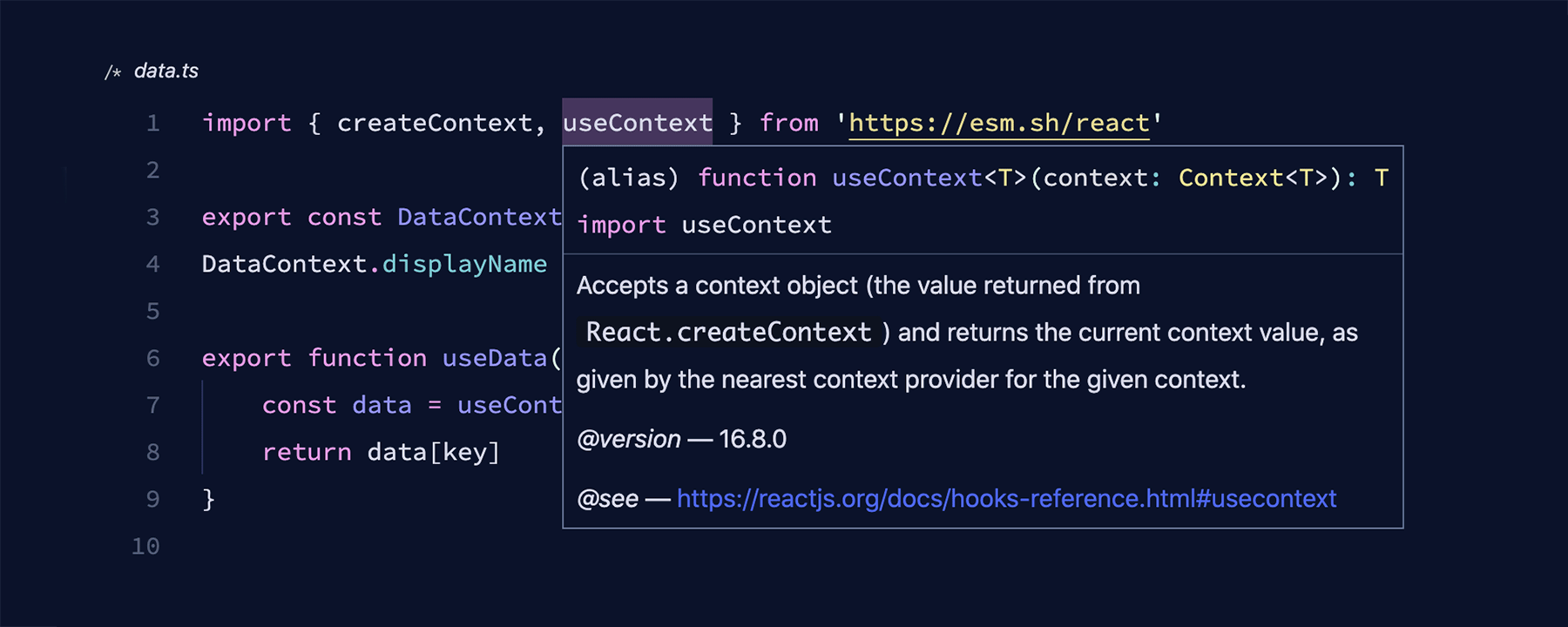A fast, global content delivery network for NPM packages with ES Module format.
import React from "https://esm.sh/react" // 18.2.0import React from "https://esm.sh/react@17.0.2"You may also use a semver or a dist-tag instead of a fixed version number, or omit the version/tag entirely to use the latest tag:
import React from "https://esm.sh/react@17" // 17.0.2
import React from "https://esm.sh/react@next" // 18.3.0-next-3de926449-20220927import { renderToString } from "https://esm.sh/react-dom@18.2.0/server"or import non-module(js) files:
import "https://esm.sh/react@18.2.0/package.json" assert { type: "json" }By default, esm.sh will rewrite import specifier based on the package's dependency statement. To specify version of dependencies, you can use the ?deps=PACKAGE@VERSION query. You can separate multiple dependencies with commas: ?deps=react@17.0.2,react-dom@17.0.2.
import React from "https://esm.sh/react@17.0.2"
import useSWR from "https://esm.sh/swr?deps=react@17.0.2"You can use the ?external=PACKAGE query to specify external dependencies.
These dependencies will not be resolved within the code. You need to use import maps to specify the url for these dependencies. If you are using Deno, you can use the CLI Script to generate and update the import map that will resolve the dependencies automatically.
{
"imports": {
"preact": "https://esm.sh/preact@10.7.2",
"preact-render-to-string": "https://esm.sh/preact-render-to-string@5.2.0?external=preact",
}
}Or you can mark all dependencies as external by adding * prefix before the package name:
{
"imports": {
"preact": "https://esm.sh/preact@10.7.2",
"preact-render-to-string": "https://esm.sh/*preact-render-to-string@5.2.0",
"swr": "https://esm.sh/*swr@1.3.0",
"react": "https://esm.sh/preact@10.7.2/compat",
}
}import useSWR from "https://esm.sh/swr?alias=react:preact/compat"in combination with ?deps:
import useSWR from "https://esm.sh/swr?alias=react:preact/compat&deps=preact@10.5.14"The origin idea was coming from @lucacasonato.
By default esm.sh will export all members of the module, you can specify the exports by adding ?exports=foo,bar query:
import { __await, __rest } from "https://esm.sh/tslib" // 7.3KB
import { __await, __rest } from "https://esm.sh/tslib?exports=__await,__rest" // 489Bimport { Button } from "https://esm.sh/antd?bundle"In bundle mode, all dependencies will be bundled into a single JS file.
import React from "https://esm.sh/react?dev"The ?dev query builds modules with process.env.NODE_ENV equals to development, that is useful to build modules like React to allow you to get more development warn/error details.
By default, esm.sh will check the User-Agent header to get the build target automatically. You can specify it with the ?target query. Available targets: es2015 - es2022, esnext, node, and deno.
import React from "https://esm.sh/react?target=es2020"Other supported options of esbuild:
-
import React from "https://esm.sh/react?keep-names"
-
import React from "https://esm.sh/react?ignore-annotations"
-
import React from "https://esm.sh/react?sourcemap"
This only supports the
inlinemode.
esm.sh supports ?worker query to load module as web worker:
import editorWorker from "https://esm.sh/monaco-editor/esm/vs/editor/editor.worker?worker"
const worker = editorWorker()<link rel="stylesheet" href="https://esm.sh/monaco-editor?css">This only works when the NPM package imports CSS files in JS directly.
esm.sh will resolve the node internal modules (fs, child_process, etc.) with deno.land/std/node to support Deno.
import postcss from "https://esm.sh/postcss"
import autoprefixer from "https://esm.sh/autoprefixer"
const { css } = await postcss([ autoprefixer ]).process(`
backdrop-filter: blur(5px);
user-select: none;
`).async()By default esm.sh will use a fixed version of deno.land/std/node. You can use the ?deno-std=$VER query to specify a different version:
import postcss from "https://esm.sh/postcss?deno-std=0.128.0"esm.sh provides a CLI script to manage the imports with import maps in Deno, it will resolve dependencies automatically and always pin the build version. To use the CLI script, you need to run the init command in your project root directory:
deno run -A -r https://esm.sh initAfter initializing, you can use the deno task esm:[add/update/remove] commands to manage imports of NPM in the import maps.
deno task esm:add react react-dom # add packages
deno task esm:add react@17 # add packages with specified version
deno task esm:add react:preact/compat # add packages with alias
deno task esm:update react react-dom # upgrade packages
deno task esm:update # update all packages
deno task esm:remove react react-dom # remove packagesBy default, esm.sh will respond with a custom X-TypeScript-Types HTTP header when the types (.d.ts) is defined. This is useful for deno type checks (link).
You can pass the ?no-dts query to disable the X-TypeScript-Types header if some types are incorrect:
import unescape from "https://esm.sh/lodash/unescape?no-dts"Since we update esm.sh server frequently, sometime we may break packages that work fine previously by mistake, the server will rebuild all modules when the patch pushed. To avoid this, you can pin the build version by the ?pin=BUILD_VERSON query. This will give you an immutable cached module.
import React from "https://esm.sh/react@17.0.2?pin=v102"The Global CDN of esm.sh is provided by Cloudflare, one of the world's largest and fastest cloud network platforms.
To host esm.sh by yourself, check the hosting documentation.
